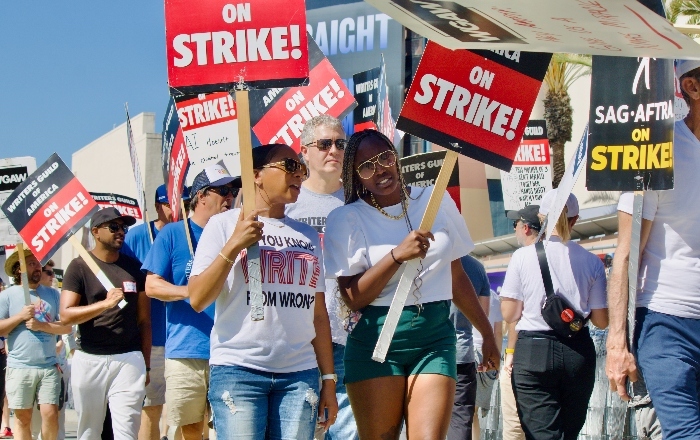
(Courtesy WGA)
Even as the Writers Guild of America (WGA) and the Alliance of Motion Picture and Television Producers prepare to re-start negotiations on Wednesday, the economic effects of the ongoing strike continue to ripple through the entertainment industry. The collateral damage extends far beyond the California and New York borders.
In Chicago, IATSE Studio Mechanics Local 476, a cornerstone of Illinois’ entertainment community, is grappling with the economic fallout, according to a new report by Crain’s Business Chicago.
IATSE Studio Mechanics Local 476, responsible for providing sets, lighting, and makeup for local productions such as Chicago P.D. and The Bear, is feeling the pinch as writers and actors remain on strike. While the spotlight often shines on the prominent figures in the industry, it’s the behind-the-scenes crew members who are grappling with the harsh realities of lost work opportunities.
Anthony J. Barracca, the secretary-treasurer of IATSE Local 476, shared the grim situation with Crain’s. “The strike has been really tough on our union members who are struggling to pay bills and put food on the table without work,” he stated. The impact extends to health insurance as well, with the union’s health plan facing a precarious situation. Contributions to the health plan are tied to hours worked, and with workers sidelined due to the strike, the reserves are dwindling rapidly.
A letter from the local’s Health & Welfare Fund highlighted the concerning trend. “Since the strike started and the majority of the health and welfare participants are not working, medical claims and prescription claims have skyrocketed at a time when almost no contributions are coming into the fund.”
Union Responds with a Food Drive and Insurance Adjustments
In response to the dire circumstances facing its members, the union has organized a food drive in collaboration with the Greater Chicago Food Depository to provide essential goods to those in need. However, the issue of health insurance remains a significant concern. With the strike showing no immediate signs of resolution, the union has been forced to take drastic measures.
The union has also decided to freeze banked hours for its members, and it is exploring potential changes to insurance policies for its roughly 2,000 members if the strike continues. To provide some form of insurance coverage, the union plans to dip into its health care fund temporarily. However, this remains a stopgap solution, particularly if the strike persists into the winter months.
Impact on Union’s Finances and Industry in Illinois
The strikes in Hollywood have had a substantial financial impact on IATSE Local 476, with earnings down by 67% this year, and hours worked reduced by 69% compared to the previous year. Even if a resolution is reached in the near future, the union anticipates a slow return to normalcy. Productions with pre-existing scripts could restart relatively quickly, but those without prepared scripts may face delays of approximately a month.
These strikes are rooted in demands for higher pay and increased job security within an entertainment industry undergoing significant transformations. Streaming services and emerging technologies like artificial intelligence have disrupted traditional models, prompting these actions.
Reel Chicago further highlighted the financial impact on Illinois’ entertainment industry, with an estimated decline of $500 million in spending compared to the previous year, based on production budgets submitted to the Illinois Film Office.
Union Stands in Solidarity
Despite the severe financial setbacks, IATSE Local 476 Studio Mechanics remains steadfast in its support of the striking actors and writers. The union’s solidarity has been evident, with members refusing to cross picket lines, forcing studio shutdowns in a show of unity.
While there is hope for an end to the strike in the near future, the financial toll on the union and its members is undeniable. As Barracca noted, “I don’t think anybody can make up for this loss. It’s been a tough pill to swallow.”
The WGA has been on strike for almost five months and SAG-AFTRA for almost two.
ALSO READ: Writers and Actors strike could cost Illinois $500 million
Sign up for our free elert here and follow us on Facebook, Twitter, Instagram and YouTube.




